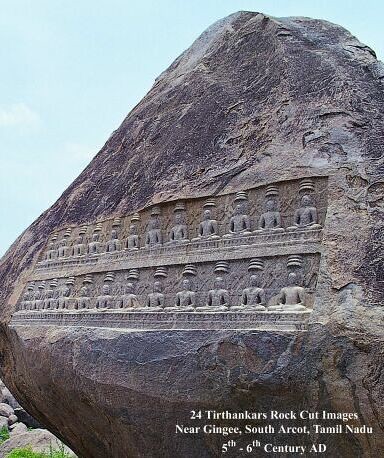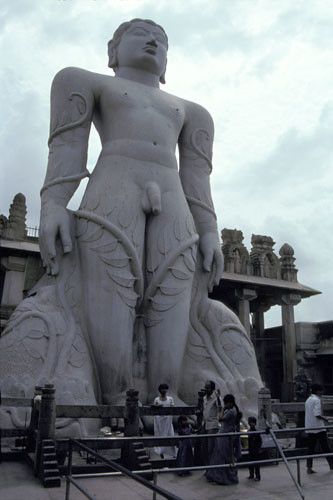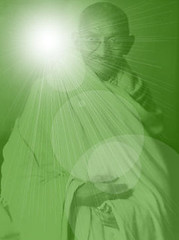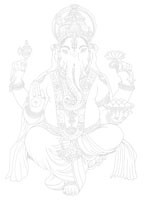Founder: Mahavira* (वर्धमान महावीर)
Number of Adherents: 4.2 mil.Approx. Foundation: ~ 556
Country of Origin: IndiaCategory: Non-theistic-Liberation
*Jains do not believe that Mahavira "founded" Jainism, but only rediscovered what, from time to time, must be found again.
OverviewIn a time when the world was ripe with spiritual conquest (time of Buddha, Confucius, Lao Tzu, and the Hebrew Prophets Isaiah, Jeremiah, and Ezekiel), Mahavira attained what he termed
kevala, or "state of omniscience". Searching among the religions of this planet, it would be hard to find a religion devoted more to peace and compassion than the Jains. From the facemask that prevents the inhalation of small lifeforms, to the whisk-broom that sweeps away crawling life from being stepped on, no other group of people has ever come to my eye with such appreciation for the beauty and unique right for life of each and every lifeform, from the two-legged to the four, from the sky-capping trees to the burrowing potato plant.
Mahavira
Mahavira, who's birth name was Vardhamana, was born around 599 BCE, in the ancient republic of Vaishali, in what is now the state of Bihar, in India. His father was a clan chieftan and his mother was tied to local power. Both parents were also linked to a religious order founded by Parshwanatha, around 200 years earlier.
Vardahamana was married and had a daughter, but at 30 he left his household, renounced his life of privilege, and eventually went naked and possessionless into the world, living on alms, fasting for long periods of time, spending much time in meditation. In his thirteenth year of such practice, Vardhamana achieved his first victory of this existence by gaining
kevala, or "state of omniscience." At this point he was known as
Mahavira, or "Great Hero."
Jain Philosophy
Jains believe that the soul is a source of all-pervading knowledge that can guide us through this world of desire and attachment through discipline and strict control, thus gaining true freedom from the oceans of rebirth and suffering. This liberation is known as
moksha.
The most well-known of Jain beliefs is the principle of
ahimsa, or non-harming. This principle pervades Jain thought and practice. The Swetambara monks can be seen with white masks over their mouths to prevent the inhalation of flying creatures, carry whisk-brooms to prevent themselves from stepping on crawling creatures, many venture outside only during the hours of the sun, and the strict will not eat root vegetables that destroy the plant itself.
 The Layman or Laywoman
The Layman or Laywoman
The layman reaches for moksha by meditating frequently (traditionaly 48 minutes), fasting, devotional practices, and maintaining vows.
The 5 Lay Vows
1. Ahimsa, non-violence
2. Truth
3. Non-stealing
4. Non-illicit Sexual Conduct
5. Non-attachment to possessions
Unlike many of the worlds religions, Jainism asks its adherents to be self-reliant. There are no priests or gods to turn to. The only true figurehead are the 24 Tirthankars, or those who have gained moksha. The 23rd was Parshwanatha and the 24th was Mahavira. They are meant as guides and not as divine beings which will intervene in the lives of the Jain who prays to them.
North and South
According to one account (one can easily guess who's side this is), in the 3rd century during a famine, a group of monks of the Jain sangha migrated and returned a few years later. They returned to find that those who stayed had taken to wearing clothing and behaving in ways that were not in agreement with the ideals of Mahavira. At this point, the Jain split. Those who had remained without clothing and upheld traditional values (in their opinion) became the Digambara, or "sky-clad" monks. The northern group who had taken to wearing clothing became the Swetambara, or "white-clad" monks.
 Jain Influence on Indian Society and Culture
Jain Influence on Indian Society and Culture
Though the Jain make up less than one-half of one percent of the Indian population, they have had a large impact on Indian culture; business, art, religion, education, and government. A massive statue of
Gomatheswara can be found in Shravanabelagola
, one of the world's largest.
Through the influence of ahimsa, vegetarianism has spread througout India. This same principle influenced Mohatma Ghandi in his struggles, first in South Africa and his most famous non-violent movement in India. This movement then influenced Martin Luther King in his non-violent movement for civil rights in the United States. That movement influenced non-violent protests of civil rights for freedom in South Africa. Who can say how much this man, clad in nothing, owning nothing, attached to nothing, gave to this world? It is sad to think that the world owes so much to Mahavira and the majority of the world knows not his name nor his religion. Though I am not a Jain myself, I recognize the great wealth of knowledge and unending illumination of the concept of ahimsa and know that these Jains are my teachers and that I have much to learn from them.
I bow to their wisdom and say a word of thanks to Mahavira for the light he has given the world.
Listing of the 24 TirthankarsWorks Cited
- Jain Heritage CentersHistory of Jainism February 2, 2006
http://www.jainheritagecentres.com/
- Wikipedia.orgWikipedia-Jainism February 2, 2006
http://en.wikipedia.org/wiki/Jain
- Heeds, Peter Indian Religions: A Historical Reader of Spiritual Expression and Experience New York: New York University Press, 2002




























